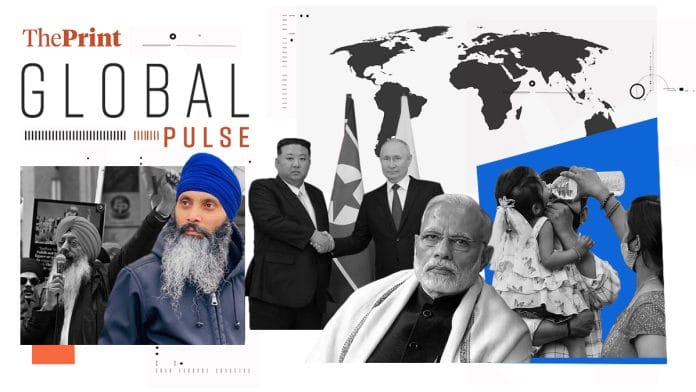New Delhi: John Reed of the Financial Times poses a pertinent question in an opinion piece — “Will Modi 3.0 be good for business?”
Ruminating on what the mood among businesses is, Reed writes, “Businesspeople are now trying to assess what a weakened Modi — more beholden than before to his coalition partners and the Rashtriya Swayamsevak Sangh (RSS), the Hindu nationalist organization behind the BJP — might mean for investment, jobs and growth.”
He points out that the last two Modi governments have “stabilised India’s once-wobbly macroeconomy”, moved towards a “digital economy”, introduced tax reforms, and that businesses loved this “strong” leader, but structural issues persist. The author questions that if structural reforms could not be undertaken in the last decade, how will the government now be assertive considering it might receive pushback from its coalition partners and even its “own political camp, including from the RSS” which is “sceptical about India opening up its defence sector, for example, and of free trade agreements such as the one New Delhi has been negotiating for more than two years with the UK.”
The piece, however, notes the continuity in cabinet portfolios, and the government’s pledge of a “Viksit Bharat”. “But one indication of the direction of Modi 3.0’s programme for business will come when a new budget is unveiled next month,” writes Reed.
After a moment of silence in the House of Commons, Canadian Sikhs wishing to commemorate the death anniversary of Sikh separatist leader Hardeep Singh Nijjar organised a demonstration near the Indian Consulate in Vancouver. To “hold India accountable”, Sikhs organised a mock trial of PM Narendra Modi, CBC News reported.
One year on, “it has become a big story”, says Georgie Smith of CBC News, as she quotes spokespersons of the community in Canada who believe that the killing of Nijjar on Canadian soil has sent a shockwave among the community which earlier felt safe outside India. “There needs to be justice, there needs to be a trial, there needs to be a conviction,” said a British Columbia Gurudwara spokesperson.
In a report for the BBC, Soutik Biswas writes about how all over India, “people are falling sick due to the heat”, while physicians say they have “never seen anything like this before”. This unprecedented heatwave has been prolonged in Delhi “with daily temperatures crossing 40C (104F) since May, peaking at nearly 50C. Humidity and hot winds exacerbate the heat, compounded by water shortages and power outages due to soaring demand”, he writes. It has also hit other parts of the country with “more than 50 deaths in just three days in early June in the states of Uttar Pradesh and Odisha,” Biswas adds.
Titled ‘Inside India’s first heat stroke emergency room’, the report quotes doctors, and those working outside. “Some three-fourths of India’s workers work in heat-exposed jobs like construction and mining. This becomes worse during heatwaves as there are fewer safe and productive work hours during the day,” the report says.
The BBC visits a ‘heat stroke clinic’ started in Delhi in May that has reported seven deaths and 40 treatments against heat-related ailments. With green spaces becoming “scarce” and people living in “congested housing”, Soutik writes that the city of Delhi is seeing its people suffer from a myriad of heat-related conditions — irritability, fatigue, and muscle cramps, to even organ failure, sometimes leading to death.
Nikkei Asia reports that amid India’s promising rise as an “alternative to China amid tensions between Beijing and the West”, an international chip industry group SEMI has chosen India as the location for its Semicon exhibition for the first time in September. Several top companies, including Tokyo Electron, Disco, Applied Materials, and Lam Research, will be participating in this exhibition, journalists Ryosuke Hanada and Kotaro Hosokawa report.
India’s labour costs are low, “equipment makers are beginning to set up shop”, it reads. The report titled, ‘India attracts chip-making equipment companies as China alternative’ notes that despite infrastructure concerns, “the administration of Prime Minister Narendra Modi announced in 2021 that it would invest 760 billion rupees to support semiconductor and liquid crystal panel production”.
Al Jazeera’s report titled ‘China fears spark Indian race for cobalt in contested ocean waters’ by Rejimon Kuttappan says that amid emerging claims by Sri Lanka and concerns over Chinese presence, India is urgently seeking rights to explore the cobalt-rich Afanasy Nikitin Seamount in the Indian Ocean. This urgency is driven by fears of China’s dominance in the cobalt supply chain and strategic interests in the Indian Ocean. India applied to the International Seabed Authority (ISA) to explore this seamount, paying a $500,000 fee for the application, but found its claim competing with another country’s — likely Sri Lanka.
US to access Swedish military basis, Putin-Kim sign mutual defence agreement
Russian President Putin’s visit to North Korea has led to the signing of a “comprehensive strategic partnership pact that includes a mutual defence clause”. This means that should either country get into a “state of war” due to armed aggression, the other “shall immediately provide military and other assistance with all the means at its disposal”. Read the CNN’s report to know more.
A Defence Cooperation Agreement between the US and Sweden has been approved by the Swedish parliament. This agreement follows Sweden’s recent accession to NATO after almost 200 years of military non-alignment and grants the US access to 17 Swedish military bases, along with the rights to deploy units and store equipment in the European country. Read DW’s report to know more.
(Edited by Zinnia Ray Chaudhuri)
Also read: Canada sees opportunity to engage with India on ‘keeping Canadians safe’ & India’s AI ambitions






